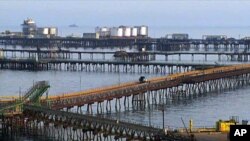From the documentary "Hummingbirds: Magic in the Air," to films about our endangered oceans and our threatened forests, there's plenty of variety at the Environmental Film Festival in Washington, D.C. However, a special focus this year is the Energy Film Series, a diverse collection of international documentaries about our quest for energy and the challenge that poses to our fragile environment.
The 19th annual festival showcases 150 documentary, feature and animated films from 40 countries. The festival screenings, which are held at dozens of theaters across the city, typically draw big crowds and help to raise public awareness of a broad array of environmental issues.
The winner of the festival's special award for Artistry in Film is Swiss director Mark Wolfensberger's “Oil Rocks - City Above the Sea” (La Cite du Petrol) a portrait of the first and largest offshore oil-drilling platform ever built. The director and co-founder of the festival, Flo Stone, says the unique Soviet-era oil city, built in 1949, provides a compelling subject for this exceptional film.
“Its about a huge city built by Stalin in the Caspian Sea that is still functioning with nine story buildings, acres of oil rigs and buildings and beautifully film," says Stone. "It interviews many people and really utilizes historic footage.”
The oil industry is the subject of several other films.“The Pipe,” tells the unsettling story of how an oil pipeline built near a pristine stretch of Irish coastline brings dramatic change to the lives of local farmers and fishermen.
The festival's 150 films include not only documentaries but also animated, archival and experimental films. And while they represent the work of artists from 40 countries, there are some gaps.
“I wish we had more films from Africa," Stone says. "We have films about Africa, but I wish we had more African films, I think we’ll be looking for that next year.”
One noteworthy film from the continent is “White Lion.” The South African feature documentary by director Michael Swan is in tune with the worldwide movement to save endangered big cats. It tells the story of a rare white lion - a messenger of the gods, in African legend - who faces a challenge greater than the harsh African wilderness: trophy hunters, who value the lion's unique skin far more than they do his legendary mission.
Another highlight of the festival is a powerful Swedish movie, “Submission,” by director Stephan Jarl. The film examines some of the more than 100,000 chemicals that we routinely encounter, some on a daily basis. The film features interviews with scientists from around the world.
“We are sitting on a ticking bomb," says writer and biologist Stefan Edman."Since the second World War, our use of chemicals has skyrocketed; from one million tons per year then, to 500 million tons now.”
For "Submission" writer and director Stephan Jarl, his film was a personal journey, too. Jarl says the movie has been popular around the world. According to Jarl, after it was shown in Sweden, the Swedish government announced it was setting up a four year program to reduce chemicals in relation to children and new born.
“Three hundred chemicals are in newborn babies today. They are pre-polluted and that is awful," says Jarl. "Fifteen percent of kids in school nowadays have neurological diseases.”
On a lighter note, the documentary “A Community of Gardeners” celebrates Washington D.C.'s suburban community gardens. Producer Cintia Cabib says the gardens not only provide fresh produce, they also serve as places of peace and healing, outdoor classrooms for children and for many immigrants, a way to remember their homeland.
“There is a community garden renaissance throughout the United States," says Cabib. "In Washington D.C. and beyond there is a huge waiting list for people who want to have a community garden plot.”
Last year, more than 26,000 people attended the D.C. Environmental Film Festival during its two-week run, taking in not just the movies but also lectures by renowned scientists and discussions with filmmakers. With rising public concerns about climate change and the environment, festival planners are hoping for an even bigger turnout this year.




